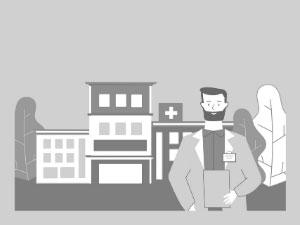Psychiatry Consultation in Italy
Search and Compare the Best Clinics and Doctors at the Lowest Prices for Psychiatry Consultation in Italy

Find the best clinics for Psychiatry Consultation in Italy
No clinics available
Thailand offers the best prices Worldwide
Price: $ 28

- Home
- Italy
WHY US?
At Medijump, we're making medical easy. You can search, compare, discuss, and book your medical all in one place. We open the door to the best medical providers worldwide, saving you time and energy along the way, and it's all for FREE, no hidden fees, and no price markups guaranteed. So what are you waiting for?

Free

Best Price

Widest Selection

Risk-Free
What you need to know about Psychiatry Consultation in Italy

A psychiatry consultation involves a conversation between you and a psychiatrist to find out what might be wrong and to come up with a management or treatment plan to help with the problem.
Psychiatry is a medical field that deals with the diagnosis, treatment, and prevention of mental health conditions. A doctor who specializes in psychiatry is called a psychiatrist. There are several reasons why someone chooses to have or is referred by their GP to see and consult a psychiatrist. These include:
-
Worry, fear, and anxiety
-
Problems adjusting after experiencing stress or major life changes
-
Depressed
-
Bad/low mood that does not go away
-
Thoughts of hurting other people
-
Suicidal thinking
-
Hurting themselves on purpose
-
Being unable to sleep, relax, or wind down
-
Having too much energy
-
Obsessional thinking
-
Constant negative thinking
-
Feeling jumpy or on edge
-
Feeling like people want to harm you or after you
-
Delusions (fixed beliefs with no basis in reality)
-
Hallucinations (seeing or hearing things that are not actually there)
-
Memory problems
-
Disjointed, rushing thoughts
-
Hyperactivity, poor concentration and attention
-
Agitation, violence, or emotional outbursts
-
Out of control drug or alcohol use
-
Problem gaming, gambling, or other addictive behaviors
-
Insomnia or other sleep problems
-
Problems around body image, dieting or eating
-
Conditions that begins in childhood, such as childhood anxiety, intellectual disability, and autism.
Mental health conditions that may be diagnosed and treated in psychiatry consultations are as follows:
-
Anxiety
-
Obsessive-compulsive disorder (OCD)
-
Depression and bipolar disorder
-
Phobias
-
Personality disorders
-
Paranoia and schizophrenia
-
Dementia and Alzheimer’s disease
-
Sleep disorders, such as insomnia
-
Eating disorders, such as bulimia and anorexia
-
Addictions, such as alcohol and drug misuse.
Psychiatry consultation is usually needed for people with long-term, terminal, or painful physical health conditions to provide psychological support as well.
What does a Psychiatry Consultation Procedure Involve?
During your first psychiatry consultation, your psychiatrist will do an initial assessment. The first consultation is usually the longest as it should give your psychiatrist time to listen to you and hear your whole story.
Be prepared to answer lots of questions. Your psychiatrist will ask you about the problem that brought you to see them and general questions about your life and thoughts. It might be hard to answer open-ended questions, but remember that there is no wrong way to answer the questions and your psychiatrist will guide you through the interview. To get the most out of your psychiatry consultation, you should come prepared so you can be specific. If you feel comfortable, you can also share the goals you would like to achieve from the treatment. All the information you give can help your psychiatrist develop an individualized treatment plan.
You will also be asked about your medical and psychiatric history, both personal and family. Therefore, make sure that you prepare the following:
-
A list of medications you are taking
-
A list of any and all psychiatric medications you may have tried in the past and how long you took them for
-
Your medical concerns and any diagnoses
-
Family history about a psychiatric problem, if there are any.
Your psychiatrist may also want to speak with members of your family and speak with other health professionals.
Next, your psychiatrist may take your blood pressure and do a basic physical checkup, including taking your temperature and weight. In some cases, other testing or scans may be ordered.
Based on the information your psychiatrist gathered and the test results, they will make a full diagnosis. Then, the next step is to create a treatment plan. A treatment plan consists of a combination of therapies that suit your needs, personal preferences, age, and family situation. Your psychiatrist may prescribe medication or suggest other treatments, such as cognitive-behavioral therapy (CBT) or counseling.
Your psychiatrist may continue to manage your treatment or you may be referred to see other health professionals, such as a psychologist.
Your next psychiatry consultation will typically be shorter than the first. In general, you will discuss how the medicines or treatments are working, and give a concise overview of how you are doing. Your psychiatrist or other healthcare professional will decide whether your medications or treatment need to be adjusted or not.
How Long Should I Stay in Italy for a Psychiatry Consultation Procedure?
You can leave the hospital or clinic as soon as your psychiatry consultation is finished. While your length of stay will depend on your circumstances, you usually do not have to stay in Italy any longer than you want to.
What's the Recovery Time for Psychiatry Consultation Procedures in Italy?
No recovery time is needed after the psychiatry consultation itself. You should be allowed to go back to your normal activities, including work and exercise, immediately after your treatment. Note that it is normal to feel emotionally drained or overwhelmed after a psychiatry consultation. Therefore, it is okay to rest after your consultation and return to your daily activities when you feel ready.
Your recovery will start after treatment, which will depend on your specific condition and the type of treatment you undergo.
What sort of Aftercare is Required for Psychiatry Consultation Procedures in Italy?
If your psychiatrist prescribes medications, make sure to take it as directed. You will probably need to see your psychiatrist regularly if your psychiatrist is providing you with psychological treatments. In addition, you may be suggested to go back to your GP for a regular checkup. They may also refer you to see a psychologist, social worker, or other therapists.
In most cases, you may need to attend more than one psychiatrist consultation. However, if your GP refers you to attend a psychiatry consultation only for a management plan or second opinion, you may not need to go back for another consultation.
What's the Success Rate of Psychiatry Consultation Procedures in Italy?
Psychiatry consultation is the first step of treatment for mental health conditions. Consultations have high success rates in diagnosing your condition and finding out the reason for your problems. There is typically no risks involved in psychiatric consultations. Discussing your past, problems, family history, and treatment goals can bring up sensitive issues that may cause you to feel a lot of emotions.
Are there Alternatives to Psychiatry Consultation Procedures in Italy?
You may be able to see other mental health professionals, such as a clinical psychologist, mental health counselor, clinical social worker, or other therapists. They usually provide therapy. However, they cannot prescribe medication.
What Should You Expect Before and After the Procedure
Before psychiatry consultation, you may experience symptoms that can interfere with your ability to function in work, school, or social environment, but you do not know the reason or the condition that you have. After the consultation, your psychiatrist should be able to make a diagnosis and help you with creating a treatment plan.
Whilst the information presented here has been accurately sourced and verified by a medical professional for its accuracy, it is still advised to consult with your doctor before pursuing a medical treatment at one of the listed medical providers
No Time?
Tell us what you're looking for and we'll reachout to the top clinics all at once
Enquire Now

Popular Procedures in Italy
Price on Request

Prices Start From $20

Prices Start From $28

Prices Start From $32

Recommended Medical Centers in Italy for procedures similar to Psychiatry Consultation

- Interpreter services
- Translation service
- Religious facilities
- Medical records transfer
- Medical travel insurance
- Health insurance coordination
- TV in the room
- Safe in the room
- Phone in the room
- Private rooms for patients available

- Interpreter services
- Translation service
- Religious facilities
- Medical records transfer
- Medical travel insurance
- Health insurance coordination
- TV in the room
- Safe in the room
- Phone in the room
- Private rooms for patients available

- Interpreter services
- Translation service
- Religious facilities
- Medical records transfer
- Medical travel insurance
- Health insurance coordination
- TV in the room
- Safe in the room
- Phone in the room
- Private rooms for patients available

- Interpreter services
- Translation service
- Religious facilities
- Medical records transfer
- Medical travel insurance
- Health insurance coordination
- TV in the room
- Safe in the room
- Phone in the room
- Private rooms for patients available

- Interpreter services
- Translation service
- Religious facilities
- Medical records transfer
- Medical travel insurance
- Health insurance coordination
- TV in the room
- Safe in the room
- Phone in the room
- Private rooms for patients available

- Interpreter services
- Translation service
- Religious facilities
- Medical records transfer
- Medical travel insurance
- Health insurance coordination
- TV in the room
- Safe in the room
- Phone in the room
- Private rooms for patients available

- Interpreter services
- Translation service
- Religious facilities
- Medical records transfer
- Medical travel insurance
- Health insurance coordination
- TV in the room
- Safe in the room
- Phone in the room
- Private rooms for patients available

- Interpreter services
- Translation service
- Religious facilities
- Medical records transfer
- Medical travel insurance
- Health insurance coordination
- TV in the room
- Safe in the room
- Phone in the room
- Private rooms for patients available

- Interpreter services
- Translation service
- Religious facilities
- Medical records transfer
- Medical travel insurance
- Health insurance coordination
- TV in the room
- Safe in the room
- Phone in the room
- Private rooms for patients available

- Interpreter services
- Translation service
- Religious facilities
- Medical records transfer
- Medical travel insurance
- Health insurance coordination
- TV in the room
- Safe in the room
- Phone in the room
- Private rooms for patients available
Psychiatry Consultation in and around Italy
Italy, a country in south-central Europe, boasts some of the most varied and picturesque landscapes in the world with the greatest collection of art treasures. The mere mention of Italy conjures up images of ancient Roman ruins, leaning tower of Pisa, stunning isles, rolling vineyards, and authentic cuisines. Besides its charming landscape, delicious food, and historical monuments, Italy is a popular spot for foreign patients to receive medical treatments. Its reputation for cutting-edge, high-quality treatment is growing rapidly. Although it is not the cheapest medical tourism destination, it is known for its highly qualified doctors and surgeons, as well as medical facilities that are equipped with the latest medical technology. Cosmetic surgery, hair transplant treatment, cosmetic dentistry, and cancer treatment are among the most popular treatments in the country.
Popular Parts of Italy
Rome, the capital of Italy, is the birthplace of Julius Caesar and is filled with Roman ruins, such as the Colosseum, Pantheon, and Forum. It is also home to Vatican City, the beautiful Sistine Chapel, the romantic Trevi Fountain, and picturesque restaurants filled with great food. Venice, another popular city in the country, is famous for its canals, gondola rides, and St. Mark's Basilica. On the west coast of Italy, visitors can find the Cinque Terre, which consists of five dramatically located hamlets. It is dotted with steep vineyards, mountains, and beautiful beaches. The fashion capital of Italy is Milan, the ancient towns of Pompeii, Naples, and stunning Florence with its Renaissance art are also popular tourist destinations.
Weather and Climate in Italy
Italy has a variable climate, so different areas can experience different weather. In general, the country has four seasons: spring (March to May), summer (June to August), autumn (September to November), and winter (December to February). Summer has marvelous weather, with sunny days and warm nights. Autumn brings cooler temperatures to the country, while the winter can be chilly or freezing, depending on the area. In spring, the temperatures start to get warmer.
Getting around in Italy
Leonardo da Vinci-Fiumicino Airport is the main gateway airport in Italy. It connects the country with numerous domestic and international destinations, including London, Beijing, Paris, New York, and Moscow. Many international visitors fly to the Milan Malpensa International Airport as well. Transport in Italy is reasonably priced and efficient. An extensive network of domestic flights is available, making it the quickest and most convenient way to travel around. Trains cover many areas across the country and have frequent departures. There are also high-speed trains connecting major cities. Although buses are slower than trains, they are cheaper and covers areas not served by trains. All major cities have good transport systems, with the bus, metro, and tram networks. In Venice, the vaporetti (small passenger ferries) are the main public transport option. Taxis are widely available and are moderately priced.
Tourist Visas in Italy
Since Italy is part of the Schengen area, nationals of EU countries do not need a visa to visit regardless of their purpose and/or length of stay. Citizens of Canada, Australia, the US, Hong Kong, South Korea, the UAE, and several other countries do not need a visa to stay in the country for up to 90 days within a six-month period. Other nationals not listed in the visa exemption countries will need to apply for a visa before visiting.
Additional Information
- Local Currency: The euro (€) is the official currency of Italy. The exchange rate from €1 is approximately US$1.17.
- Money & Payments: ATMs can be found easily throughout Italy, but make sure to be vigilant when making cash withdrawals in tourist areas since pickpocketing is common. Major credit cards are widely accepted. Tipping is not expected. However, you can always tip an extra 10% to 15% for exceptional service.
- Local Language: Italian is the official and most commonly spoken language in Italy. English is not widely spoken, except in larger cities such as Rome, Milan, and Florence.
- Local Culture and Religion: Roman Catholicism makes up around 80% of the population. The other 20% is made up of Muslims, agnostics, and atheists.
- Public holidays: Italy mostly celebrates Christian holidays. Some of the most important are Epiphany, Pasquetta, Saints Day, Liberation Day, and Christmas.
Popular Searches
- Plastic Surgery in Thailand
- Dental Implants in Thailand
- Hair Transplant in Thailand
- Breast Augmentation Thailand
- Gastric Sleeve in Thailand
- Gender Reassignment Surgery in Thailand
- Laser Hair Removal in Bangkok
- Botox in Bangkok
- Dermatology in Bangkok
- Breast Augmentation in Bangkok
- Coolsculpting in Bangkok
- Veneers in Turkey
- Hair Transplant in Turkey
- Rhinoplasty in Turkey
- Stem Cell Therapy in Mexico
- Rhinoplasty in Mexico
- Liposuction in Mexico
- Coolsculpting in Tijuana
- Rhinoplasty in Korea
- Scar Removal in Korea
- Gastric Sleeve in Turkey
- Bone Marrow Transplant in India
- Invisalign in Malaysia
- Plastic Surgery in the Dominican Republic
- Tummy Tuck in the Dominican Republic
- Plastic and Cosmetic Surgery in Poland
- Rhinoplasty in Poland
- Hair Implant in Poland
- Dental Implants in Poland
- IVF in Turkey